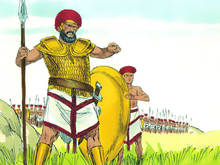David – a shepherd
By Mark Morgan | David

What is God like? Do you know how he thinks or what his character is like?
When we are looking for friends, we want them to have characteristics we appreciate or admire – often ones that will match or complement our own.
God does the same.
When God rejected Saul as king over Israel, he told him that he had found a man after his own heart to be the next king.[1] This man was David, the son of Jesse[2] from Bethlehem, who became famous when he used a sling to kill Goliath the giant.
The expression, “a man after his own heart”, reveals a kinship of thought and fellowship of mind between God and David.
For me, it prompts the question: what was it about David that God liked?
God gives some hints when he sends Samuel to anoint one of Jesse’s sons as king. Seeing the appearance of David’s oldest brother, Samuel is impressed, but God tells him, “Do not look on his appearance or on the height of his stature, because I have rejected him. For the Lord sees not as man sees: man looks on the outward appearance, but the Lord looks on the heart.”[3]
David’s visual appearance was not what mattered to God, but what he was like as a person – although we are also told elsewhere that David was very handsome.[4] However, this was not what mattered.
The book of Samuel tells us of David’s background as the youngest of eight sons and shepherd of the family’s flock – brave enough to defend the flock, even fighting lions and bears to protect the sheep.[5] He was also an excellent musician,[6] a courageous and successful warrior,[7] and an outstanding leader of men.[8]
This is the amazing description of Israel’s most successful king: a wildly popular leader, yet close to God as well. How did he manage to please two such incompatible and often conflicting audiences?
He didn’t achieve the feat through compromise. Everyone knew what David stood for – and admired it.
When David had to run away and hide from an increasingly unstable King Saul, a growing band of men – 400-600 of them – joined David.[9] These men were in trouble, in debt or discontented, and many appear to have brought their families with them. David was able to form this rabble into a small but disciplined army, guiding them with exceptional leadership and strong conviction that inspired them to worship God with him.
Once when Saul was hunting David with the intention of killing him, Saul entered a cave in which David and his men were hiding. Despite having the perfect opportunity to kill Saul in the darkness of the cave, David prevented his men from doing so because God had anointed Saul as king, and David believed, and that it was up to God to remove him, not David or his men.[10] David’s clarity of moral focus may well be one of the reasons why God chose him.
David was not only a successful shepherd of sheep – he felt a need to shepherd his men as well. And the people appreciated David’s unimpeachable leadership.
One example is when Abner, the leader of Saul’s army, was tricked by two of David’s relatives and assassinated.[11] This disposed of a dangerous rival and David could have quietly rejoiced, but he believed the killing to be wrong and publicly mourned and fasted, making it clear that he did not approve of the killing and had not ordered it. The people took notice of his actions and were pleased with David’s attitude.[12]
We could sum it up by saying that David was not only a man with high moral standards, but also a leader who could inspire others to adopt his high moral standards. In the end, this was why he could please both God and his people.
About 50 years after the death of David, when the kingdom he ruled over had been split in two because of the idolatry of his son Solomon, God said to Jeroboam the king of Israel “…you have not been like my servant David, who kept my commandments and followed me with all his heart, doing only that which was right in my eyes”.[13]
Some time ago, we wrote an article about David’s legacy, and that legacy grew from his success as a man after God’s own heart and a shepherd of Israel.
Unfortunately for David and his nation, he was not perfect in everything he did, but God’s summary of David’s life and attitude was that he kept God’s commandments and followed him with all his heart, doing what was right in God’s eyes. No wonder he was Israel’s most famous king!
Although many other kings ruled after him, David remained the king God to referred to with approval, even promising that Jesus would reign on David’s throne forever.[14]
Anointing Bible Kings
Shepherds/shepherding (Wikipedia)
King David (Wikipedia)
Notes
| ↑1 | 1 Samuel 13:14 |
|---|---|
| ↑2 | Acts 13:22 |
| ↑3 | 1 Samuel 16:7 |
| ↑4 | 1 Samuel 16:12 |
| ↑5 | 1 Samuel 17:34-37 |
| ↑6 | 1 Samuel 16:18 |
| ↑7 | 1 Samuel 16:18; 18:7; 21:11; 29:5 |
| ↑8 | 1 Samuel 18:13-14, 30; 22:1-2 |
| ↑9 | 1 Samuel 22:1-2; 23:13 |
| ↑10 | 1 Samuel 24:3-7 |
| ↑11 | 2 Samuel 3:6-30 |
| ↑12 | 2 Samuel 3:33-37 |
| ↑13 | 1 Kings 14:8 |
| ↑14 | Luke 1:31-33 |